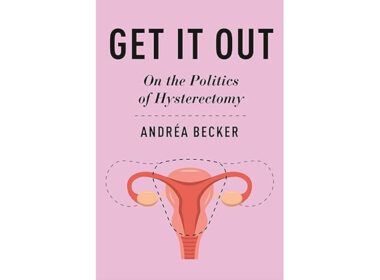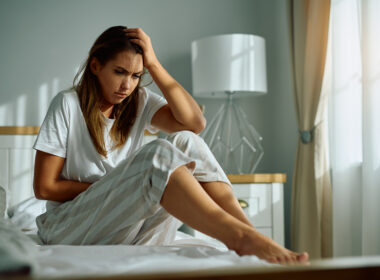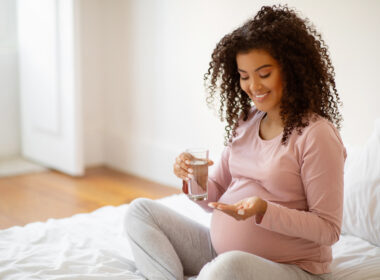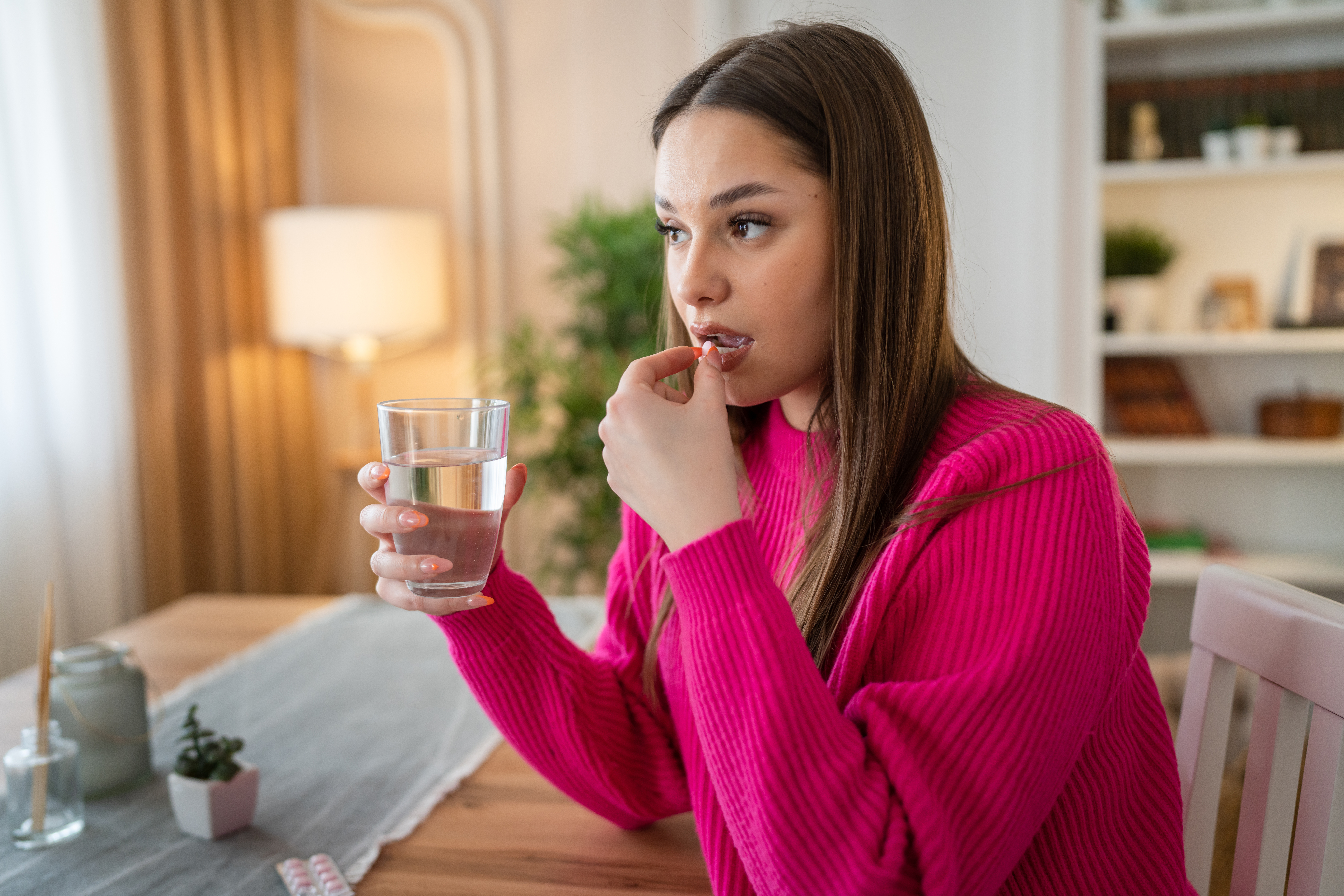If I offered you the option of a hormone-free pill for endometriosis symptoms, would you jump at the chance to try it? What would your response be if I clarified that the medication “works” by putting your body into medically-induced menopause? And that it can cause the same bone density loss issues as the notorious Depo-Provera shot? Oh, and that it might make you suicidal? What then?
“ORILISSA is different—it’s not a painkiller, injection, surgery, or birth control. And, it does not contain hormones.” So reads manufacturer Abbvie’s website for Orilissa (generic name elagolix), which was FDA approved in 2018 and has been prescribed to over 125,000 women. According to Abbvie, Orilissa is the first medication developed specifically for moderate to severe endometriosis pain, including painful periods, pelvic pain anytime, and pain with sex. (However, the Orilissa website acknowledges that only the higher dosage—the one that causes more severe side effects—is effective in reducing pain with sex.)
How does Orilissa medically induce menopause?
The Orilissa website’s description of how the medication works sounds innocuous enough. It states that “Two different doses of ORILISSA dial down estradiol to help control endometriosis pain.” Under Mechanism of Action in Orilissa’s full prescribing information document, we further read:
“ORILISSA is a GnRH receptor antagonist that inhibits endogenous GnRH signaling by binding competitively to GnRH receptors in the pituitary gland. Administration of ORILISSA results in dose-dependent suppression of luteinizing hormone (LH) and follicle-stimulating hormone (FSH), leading to decreased blood concentrations of the ovarian sex hormones, estradiol and progesterone.”
It’s that last point—the one about decreased blood concentrations of estradiol and progesterone—where the trouble comes from.
In fact, the dramatic drop in estrogen caused by Orilissa is so steep that it causes a medically-induced menopause, although it is presumably reversible once the medication is stopped. (According to the manufacturer’s website, in women who took Orilissa for 6 months, “the majority of women, ~60%, in clinical trials who took either dose of ORILISSA got their period within a month after they stopped taking ORILISSA. And about 95% got their period within 6 months.”) The dramatic drop in estrogen experienced by women on Orilissa is not only responsible for the loss of their pain (and periods), but it’s also the culprit behind the drug’s potentially severe side effects (more on this in a minute).
Orilissa may relieve endometriosis pain…
A 2023 literature review reported that after one year of treatment, Elagolix (i.e., Orilissa) users reported 50-52% reduction in painful periods in the lower dose group, and 76-78% in the higher dose group [1]. General pelvic pain was reduced by 66-68% in the lower dose group, and by 67-69% in the higher dose group. Pain with sex was the clinical endpoint least improved by Orilissa. Still, low dose users reported a 45% improvement, while higher dose users reported a 58-60% improvement [1].
….But that’s not all it can do
Manufacturer Abbvie’s list of Orilissa’s most common side effects reads like a who’s who of menopause symptoms, including “hot flashes and night sweats, headache, nausea, difficulty sleeping, absence of periods, anxiety, joint pain, depression, and mood changes.” But wait, there’s more. The physician prescribing information leads off with specific warnings for bone-density loss (comparable to the disastrous Depo-Provera shot) even in healthy young women, “suicidal ideation and mood disorders,” liver injury, and increased blood clot risk if taken with hormonal contraceptives (which shouldn’t be taken during or 28 days after stopping Orilissa).
Importantly, a 2021 literature review on GnRH antagonists for endometriosis noted that the longest research trials conducted to date lasted for just one year, so no “long-term” safety data is available yet. However, fully 90% of participants taking Orilissa for a year reported hot flashes. The same review observed that after just one year of Orilissa use, women experienced decreased bone mineral density (BMD) in the lumbar spine by 20-23% from the beginning of treatment, depending on the dosage. For context, women in early menopause (the most significant period of natural bone mineral density loss in a woman’s life) experience up to 2.5% BMD loss in a year [2]. Of note, the hot flash and BMD loss side effects of Orilissa are comparable to those of another oral GnRH antagonist, relugolix, but worse than those associated with injectable GnRH antagonists cetrorelix and ganirelix.
Also after just 12 months, women’s LDL cholesterol, HDL cholesterol, total cholesterol (i.e., LDL + HDL) and triglycerides—all markers of metabolic health—were higher than when the women started Orilissa. HDL is called ‘good cholesterol’ because it helps remove the other forms of cholesterol from the body. Elevated levels of LDL cholesterol and triglycerides, on the other hand, significantly increase your risk of heart attack and stroke.
What treatment options do women have for endometriosis that don’t risk their bone health, mental health, cardiovascular health, liver health, and more?
As we’ve emphasized over and over again at Natural Womanhood, women need their periods. Most accurately, they need the health benefits that come from regular ovulation (and ovulation precedes every true period). In fact, regular ovulation specifically benefits bone and brain health, the exact opposite of what Orilissa does. Shutting down a woman’s hormones altogether, which is the desired effect of Orilissa, deprives women of these benefits.
Our Endometriosis topic page covers everything from the urgent need for earlier diagnosis (preferably as soon as the teen years), to symptoms, to treatment options (including a medication that is “safe, cheap, and old”), and more. After reading through these articles, a great next step for getting actual, safe treatment for endometriosis is to seek out a clinician trained in restorative reproductive medicine (RRM), which seeks to optimize a woman’s hormones so that she can reap all the rewards of healthier cycles–including diminished pain.
The bottom line
For some women, endometriosis pain may be so intense and life-altering that they’ll try anything, but Orilissa is a far cry from the endometriosis treatment women deserve. As one cautious article about Orilissa summed up, “If we’re getting excited about pills that force us into early menopause, thin our bones and possibly make us suicidal, we still have a long way to go.”







